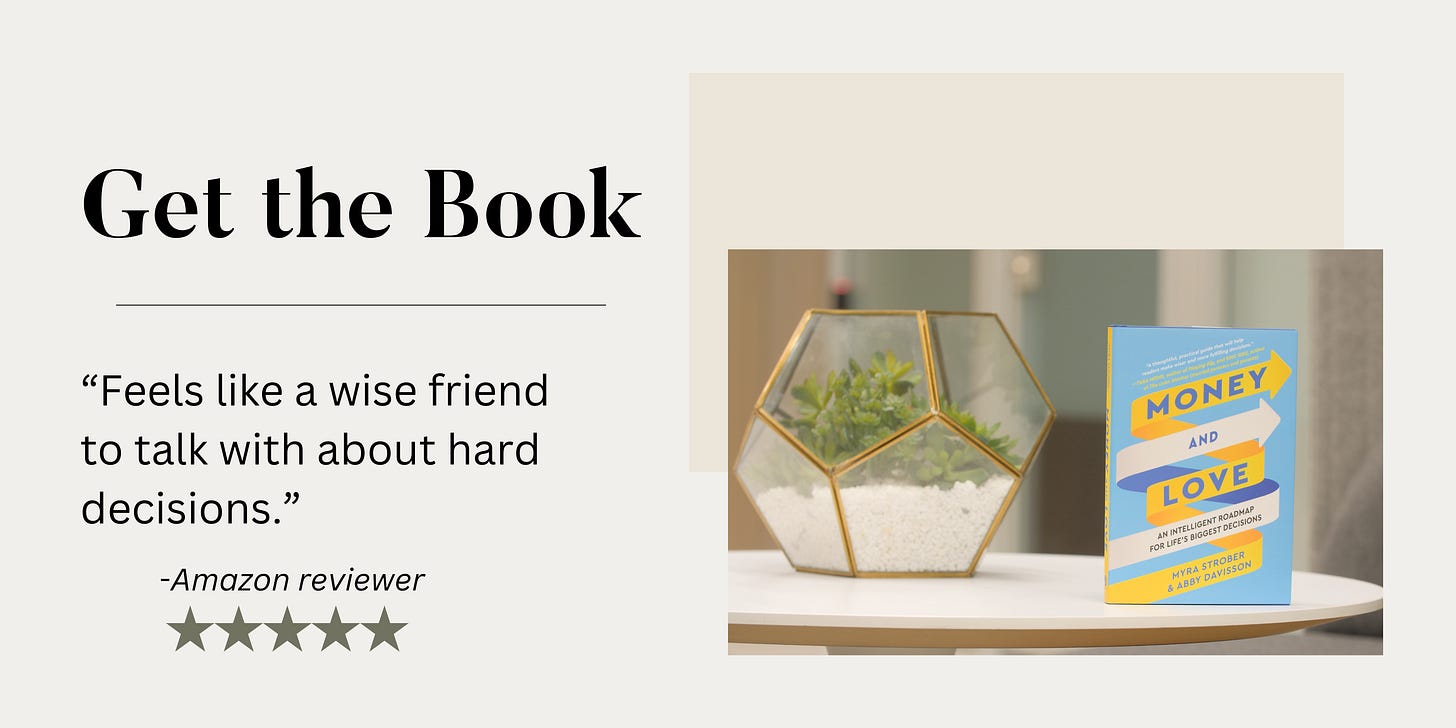The Long-Term Benefits of Repotting
Why I've embraced the challenge of new beginnings (and you should, too)
The renewal notice caught me by surprise. On Saturday afternoon, I checked my email as I was waiting for my boys to finish getting haircuts, and I saw my credit card had been charged for another year of Interact, the service that powers the interactive quiz on our book website. “Wow,” I thought, “has it already been a year?”
One year ago, I entered my credit card information and taught myself how to build an interactive quiz. I’ve been an avid quiz consumer for decades - since my days of reading paper issues of Seventeen magazine (RIP) as a teenager - so when several experienced authors recommended putting a quiz on our book website, I enthusiastically developed one (Myra was less enthusiastic, but she humored me even as she noted that our quiz did not meet her standards for scientific rigor).

The online quiz platform (Interact) is one of many new SaaS platforms I’ve researched, purchased, and taught myself over the last year, along with an email service provider (ConvertKit), website builder (Squarespace), appointment scheduler (Calendly), electronic signature service (DocuSign), accounting software (Freshbooks), and newsletter platform (Substack). The entrepreneurial SaaS learning curve is real, and that’s not counting the many platforms I already knew how to use (e.g., Zoom); use but don’t pay for yet (e.g., Mentimeter); and other non-SaaS services (including legal and financial) I’ve learned to navigate.
Truth be told, learning new online platforms has been relatively easy compared to the habits and mindsets I’ve needed to shift as I’ve made the pivot from a W2-employee to a self-employed entrepreneur (more on this in a future newsletter).
It can be hard - and humbling - to feel like a beginner, especially several decades into your career.
But, as it turns out, there are also hidden benefits.
Learning new skills changes your brain (in good ways)
When I shared my challenge of feeling like a beginner in midlife with my friend
, she mentioned Tom Vanderbilt’s book Beginners: The Joy and Transformative Power of Lifelong Learning. Initially inspired by watching his young daughter compete in chess tournaments (and not wanting to imply to her that learning is only for children), he embarks on a year-long quest to teach himself new tricks. He tackles five skills, choosing them “for their difficulty to master and their lack of marketability–chess, singing, surfing, drawing, and juggling.”1In each chapter, Vanderbilt reports on his own personal experience learning said new skill along with all the benefits to be gleaned, rooted in psychology and scientific research. Juggling, for example, starts to rewire your brain after only one week, and research has shown visible changes in brain connectivity on MRI images after six weeks of juggling lessons.
I haven’t had my brain imaged recently, but I like picturing the new neural connections I’ve developed (which also may explain why my brain has felt more tired than usual over the past year).
I appreciated the book’s reminder that the willingness to be an adult beginner is a skill in itself - one that’s especially important to nurture as we progress in our careers and in life.2
“Repotting is how you get new bloom”
Nearly ten years ago, I encountered the concept of repotting your career in a Stanford GSB Insights article. At the time, I had a one-year old and was eight months into my first full-time private sector job; the article resonated deeply, as I had recently repotted my entire identity alongside my career.
John Gardner originated the idea of repotting your career in his book Self-Renewal. Just as plants eventually need to be transferred to bigger pots in order to continue thriving, humans must seek new knowledge, skills, and environments in order to remain vital. The process of repotting is messy and stressful in the short-term, but it leads to new growth, and eventually, to new blooms.
As humans, we have a powerful present bias, which leads us to overvalue the short-term and undervalue the long-term when it comes to making tradeoffs. This present bias often works against repotting, because the short-term challenges of repotting are real. I can personally attest to this!
Over the past year, in addition to repotting my career, my husband repotted his (by launching his own investment firm), and we’ve repotted our family in a new school community. We haven’t changed where we live, but we’ve changed almost everything else about our daily lives.
As a result, we’ve all felt like beginners a lot. It’s been uncomfortable at times, and we’ve had to have faith that the blooms will eventually appear.
Thankfully, we’re starting to see some buds. Our fifth grader (who declared we were “ruining his life” by enrolling him in a new school for fourth grade) seems to be thriving in his new soil. Ross and I appreciate having more autonomy over our schedules. Even our third grader, who has only recently repotted, appears to be a bit perkier.
It hasn’t been easy, and we still have more adjusting to do, but I’m glad we pushed through the short-term stress of repotting in order to foster longer-term growth.
Repotting more frequently throughout our careers is something we’ll all have to get used to doing, given changes driven by increased longevity, advances in technology, and other trends.
As we live longer, repotting will become the norm
In their excellent book The 100-Year Life: Living and Working in an Age of Longevity, Lynda Gratton and Andrew J. Scott lay out a compelling case for the fact that due to increases in life expectancy, the “three-stage life” that dominated much of the twentieth century (a first stage of education, followed by a career, and then retirement) simply won’t work in the future. In their words:
“The only way a three-stage life can be made to work over 100 years is with a very long second stage of continuous employment. That might make the finances balance, but it doesn’t work for the other things that matter. Stretched over time it becomes too hard, too exhausting, and quite frankly, too boring.”3
Gratton and Scott predict that the three-stage life will by necessity give way to a multi-stage life with more frequent transitions - in other words, more frequent repotting. Moving away from the traditional three-stage life will require us to engage in more self-reflection and periods of re-creation, where we’re investing in our skills, health, and relationships.
When we’re in these periods of transition, we’ll likely feel like beginners. Yes, it will be uncomfortable, but it will serve us better in the long-run - and we’ll be in good company.
So here’s to embracing feeling like a beginner, even in midlife (or beyond).
Have you repotted your career or anything else about your life recently? Taken up a new skill? I’d love to hear about your experience in the comments.
Abby’s Latest
Last Sunday we attended a third grade Halloween potluck in Golden Gate Park. We brought homemade mochi muffins, and no fewer than three people asked for the recipe (I’ve linked to it above; you’re welcome).
My all-time favorite mochi muffins are made by Third Culture Bakery, which you should absolutely try at some point, but these homemade ones are a close second. You can find mochiko (sweet rice flour, I recommend the Koda Farms brand) at Asian markets and many larger grocery stores (you can also buy it online). The muffins are best the same day but if you freeze them, they heat up nicely in an oven later.
Also, stay tuned! Earlier this week, I sent out packages of my favorite dark chocolate bars to three lucky paid newsletter subscribers who won the drawing (congratulations Diana, Carol, and Shari!). But then I wondered, shouldn’t everyone who reads this newsletter get to try this amazing chocolate? I’ll share a discount code in a future issue. If you’re anything like me, you’re probably making your way through piles of leftover Halloween candy right now anyway.
Deliberately yours,
Abby
https://tomvanderbilt.com/books/beginners-the-joy-and-transformative-power-of-lifelong-learning/
I feel compelled to say that while I enjoyed the book, I found myself getting annoyed at the fact that Vanderbilt barely acknowledges the work that his wife (also an author and journalist, Jancee Dunn) must have been doing behind the scenes when he was surfing in Costa Rica and having other far- and near-flung adventures during his year of learning.
Gratton, Lynda and Andrew J. Scott. The 100-Year Life: Living and Working in an Age of Longevity. (London: Bloomsbury Publishing, 2020), 7.






Yes yes, repotting is such a good metaphor. Thank you for introducing me to it!
I love this concept of repotting, Abby! Thank you for sharing.